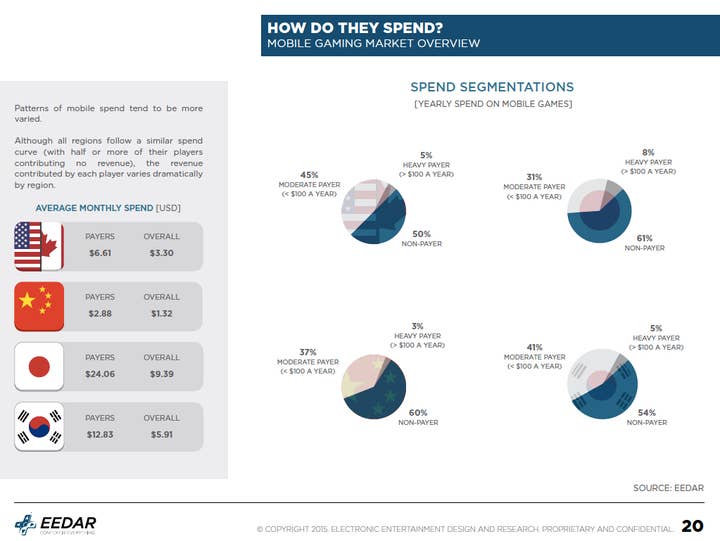Mobile games market worth $25bn - EEDAR
The Asia Pacific markets control over half the revenues worldwide, with Japan seeing the biggest percentage of heavy spenders
According to EEDAR's new report, Deconstructing Mobile & Tablet Gaming 2015, the global market for mobile gaming is worth about $25 billion by the end of this year, dominated by the US, Japan and China which generate revenues of $5.41 billion, $5.16 billion and $5.01 billion, respectively. South Korea trails at $1.37 billion, but the Asia Pacific countries as a whole make up the majority of the world's mobile gaming market with 50 percent of the world's mobile gamers generating 56 percent of global revenues.
There are numerous interesting pieces of data in the report (which you can download for free here). For example, the US is the only major market where women (55 percent) actually outnumber men in mobile gaming. In Japan, China and South Korea, that's flipped with men representing in the range of 55-60 percent.
Also of note is the change in spending patterns across regions. Japan easily has the highest percentage of heavy spenders (greater than $100 a year) at eight percent but at the same time the country also has the highest percentage of non-spenders at 61 percent. The US by contrast has the lowest percentage of non-spenders (50 percent) but a fairly high percentage (45 percent) of moderate payers, or people who spend under $100 a year on mobile games. The chart below has the full breakdown.

More than ever before, it's important to recognize that one size does not fit all in the mobile marketplace.
Dr. Heather Nofziger, social psychologist and lead analyst on the report, commented, "The Asian markets are continuing to see strong growth, especially in China (which already makes up over half of the worldwide audience), but are beginning to show signs of maturing. As they stabilize, a nuanced understanding of how and why gamers differ regionally becomes all the more important - to ensure that new market entrants can maximize appeal and are meeting the needs of their players."

